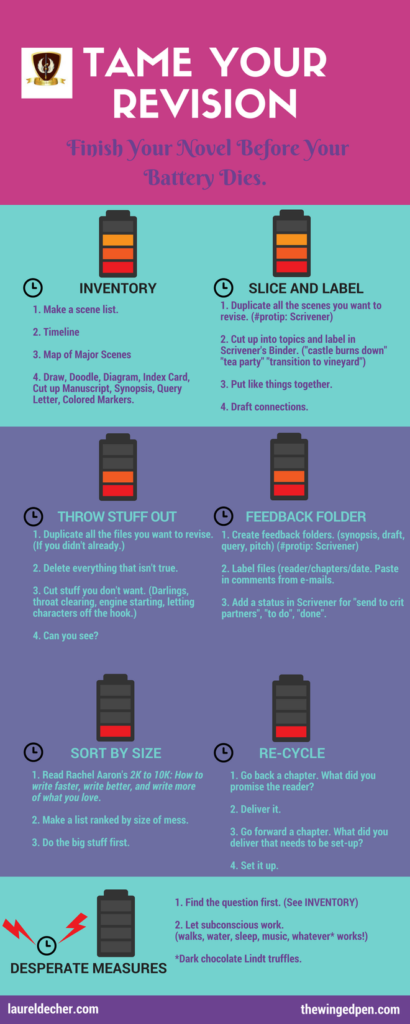
Revising a novel is a form of bookkeeping. How do you keep from losing your mind? At The Winged Pen, we’re talking Revision. This post is part of a TAME YOUR REVISION series that started over at The Winged Pen.
Here are links to the individual posts:
- Inventory
- Slice and Label With Scrivener
- Throw Stuff Out–There’s no separate post for this one. Everything I have to say is on the infographic. 🙂
- Feedback Folder
- Sort By Size
- Re-Cycle
- Desperate Measures
You can download the infographic.
To go along with the Winged Pen’s post, I’m attempting a “how-to” series. Let me know how you like it.
If you find yourself in a revision rut, may this jog your creative process back onto the smooth road.
This week’s topic is DESPERATE MEASURES.
I’ve written about how to get the juice back into your writing life before.
*cough* I never have trouble with revision. Why do you ask? 😉
I once interviewed author and scientist, Paul Kindstedt, about his creative process while writing his epic Cheese and Culture: A History of Cheese and its Place in Western Civilization.
It takes creative muscle to write 9,000 years of cheese history! When I asked him how he did it, he talked about hiking, cross-country skiing, and ways to “refresh your mind.”
Creativity doesn’t happen by force. Discipline to keep showing up is important. But so is playfulness. Maybe you need the discipline of play. . .
In that spirit, here are a few more ways to help a recalcitrant novel along:
- Tiny tasks. Years ago, the psychological heaviness of my dissertation slowed me to a crawl. Finally, I bought a tiny spiral notebook and made a list of the teeniest tasks possible for the day: “Print out graph.” “Buy tape.” One day, my husband came home and I was reading a novel on the couch. “Didn’t you have to work on your dissertation?” he asked. “I finished for today,” I said, secure in the virtue of checking off my tiny task for the day. But here’s the funny thing: Tiny tasks get the thing done.
- Help someone else. Offering critique for a fellow writer’s work can do wonders for the creative process. It can help your self-esteem, inspire you to greater heights, help you to understand problems in your own writing, and give you confidence to improve your own pages. And that’s even if they don’t offer to reciprocate.
- Project switch. You can trick your creative brain into believing that you’ve left the “hard” project behind. Try a blog post or a small task to build up your courage before sneaking up on the monster manuscript.
- Fly and be free! You’ve worked through your pages, gotten critique, studied writing books, and maybe even suffered through your editing letter. Give yourself a break. Writing is supposed to be fun, remember? Let it rip for a change. You might be surprised when you look at it later. (keyword=later.)
- Overcomplication disease. If you write intricate stories full of plot twists and setting details, you might need the question that moves my work forward.
Happy Revising! And don’t forget ways to refresh your mind!
Have you got desperate measures to share? What works for you?
Save
Save
Save
Save
Save
Save
Save
